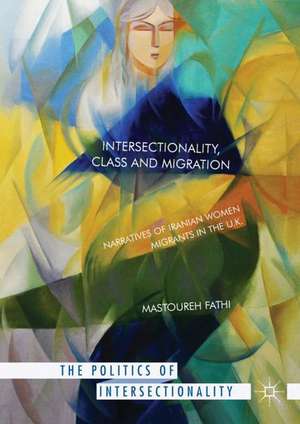Intersectionality, Class and Migration: Narratives of Iranian Women Migrants in the U.K.: The Politics of Intersectionality
Autor Mastoureh Fathien Limba Engleză Hardback – 8 oct 2017
Preț: 583.45 lei
Preț vechi: 686.42 lei
-15% Nou
Puncte Express: 875
Preț estimativ în valută:
111.64€ • 115.18$ • 93.17£
111.64€ • 115.18$ • 93.17£
Carte tipărită la comandă
Livrare economică 26 martie-09 aprilie
Preluare comenzi: 021 569.72.76
Specificații
ISBN-13: 9781137525291
ISBN-10: 1137525290
Pagini: 193
Ilustrații: XVII, 193 p.
Dimensiuni: 148 x 210 mm
Greutate: 0.4 kg
Ediția:1st ed. 2017
Editura: Palgrave Macmillan US
Colecția Palgrave Macmillan
Seria The Politics of Intersectionality
Locul publicării:New York, United States
ISBN-10: 1137525290
Pagini: 193
Ilustrații: XVII, 193 p.
Dimensiuni: 148 x 210 mm
Greutate: 0.4 kg
Ediția:1st ed. 2017
Editura: Palgrave Macmillan US
Colecția Palgrave Macmillan
Seria The Politics of Intersectionality
Locul publicării:New York, United States
Cuprins
1. Class, Intersectionality and Iranian Diaspora.- 2. Intersectionality and Translocational Class.- 3. Classed and Gendered Growing Up.- 4. Classed Place-Making.- 5. Classed Performing.- 6. Classed Racialisation.-7. Classed Belonging.-8. Understanding Class Intersectionally: A Way Forward.
Recenzii
“Fathi’s work is of particular interest to anthropologists, political scientists, sociologists and other social scientists interested in transnational migration, class, race, gender, citizenship and intersectionality. Her work is particularly interesting too, to those social scientists, who are intrigued by the messiness and complexity of social life, as well as the possibility of ‘studying up’ within migrant communities.” (Joy Owen, Nordic Journal of Migration Research NJMR, Vol. 09 (1), 2019)
Notă biografică
Mastoureh Fathi is Lecturer in Sociology at Bournemouth University, UK. She has published on the topics of belonging, gender, education and social class among migrants. She is a narrative researcher with an interest in Muslim migrants, and their everyday experiences of life in Western countries. Her current research looks at the intersection of religion, gender and parenting.
Textul de pe ultima copertă
This book offers critical analysis of everyday narratives of Iranian middle class migrants who use their social class and careers to "fit in" with British society. Based on a series of interviews and participant observations with two cohorts of "privileged" Iranian migrant women working as doctors, dentists and academics in Britain—groups that are usually absent from studies around migration, marginality and intersectionality—the book applies narrative analysis and intersectionality to critically analyse social class in relation to gender, ethnicity, places and sense of belonging in Britain. As concepts such as "Nation," "Migrant," "Native," "Other," "Security," and "Border" have populated public and policy discourse, it is vital to explore migrants’ experiences and perceptions of the society in which they live, to answer deceptively simple questions such as "What does class mean?" and "How is class translated in the lives of migrants?"
Caracteristici
Features rare scholarship that studies case studies of Iranian migrants under the lens of social class Analyzes class in a novel variety of different contexts, including gender, ethnicity, place and belonging Based on empirical research of oft-overlooked migrant groups: women working as doctors, academics, and other traditionally esteemed professions Includes supplementary material: sn.pub/extras





